How one moment stretches across two weeks
Second dispatch from the wine & world of Southern Appalachia.
Warming temps are bad for winegrapes, but the other climate threat to the wine industry is that an unprecedented storm could flood your beloved, mountainous region, shredding access roads to historical towns, and snatching water infrastructure, cell towers, and power lines. It could pull neighborhoods down their slopes like a shade over a window. As easy as water can bend an iron beam, the supporting structure of your tourism-reliant industry could simply drift away.
This is what happened to the entire food and beverage industry in Western North Carolina last week, especially our lovable wine scene, which I started researching and writing at the beginning of the year.
I’ve found myself in a situation I’ve never been in, and in this moment I’m doing my best to look to those around me who have been acting as community hubs long before this happened. Firestorm Bookstore, Beloved Asheville, Overmountain Vineyards, Plēb Urban Winery, and Southern Dharma Center are my role models this week, and I’m doing my best to learn how to be useful by watching them.
Right now my days look like this: get my writing and freelance work done in the morning, then head out into the community for the afternoon. There have been a few times I’ve headed to a distribution center in Asheville and never made it, finding needs along the way. Yesterday I drove with a neighbor to deliver food to a shaken-up friend whose house had been narrowly spared by a landslide, stopping just short of him, splitting, and carrying on to wash away the road that leads down from the top of the mountain on which he lives. He met us on his ATV at the closest point we could drive to and told us, “the world turned liquid.”
Today I’m looking for 25 lb bags of sugar for beekeepers. The goldenrod, which was in full bloom last week, is gone, along with the other wildflowers that the bees live off of at the start of autumn, so their food needs to be supplemented. Farmers, many of whom have barely paused their relief efforts to glance at their fields, littered with everything from dishwashers to slabs of road, need supplies and hay for their cattle.
The weather turned cold yesterday and the many, many people still trapped without water and power need warm clothes, generators, and gas. Diapers, single-use formula, and visits from the Flush Brigade, a grassroots organization bringing buckets of nonpotable water to flush every toilet, are needed badly.
The mud in Marshall and Hot Springs, having passed through industrial sites, a nuclear plant, and disrupted sewage systems, has on the streets and every nook and cranny of every building. We need full PPE to provide volunteers who have begun the long process of cleanup.
People are still missing and the terrain is challenging. Flattened houses and mangled cars are everywhere they shouldn’t be, and it feels like a lot more time will pass before we have an idea of how many people we lost in this storm, and who they are.
Thirteen days in, with the horrifying sight of Hurricane Milton heading towards Florida, perhaps the world is growing a little bored of our ordeal, but most of the people on the ground haven’t yet stopped for one minute to take it in. The reality comes to me slowly, in moments when I pass a line of naked trees bent at ninety degrees along the French Broad River, plastic piping tangled where changing leaves should be.
The climate crisis was here before, but for the first time, I’m seeing with my own eyes just how explicit its violence can be. With it, a new understanding of how communities before mine have trudged through these kinds of events, the faraway chatter of social media humming but not quite registering, like voices coming to you from the waking world while you work to clear roads in a dream.
With it also, a heavy anticipation for the many people who will have the consequences of human-driven global warming laid bare for them to take in over the coming years. As my good friend Miranda said recently, “devastation is bleak.”
The only thing I can accurately relay to any readers who haven’t yet had to contend with this devastation is this feeling I’m all too familiar with, one we shared in 2020: the sense that something has been irreversibly changed, that a new normal looms up ahead, the shape of which I can’t quite make out.
Donate to relief funds:
Beloved Asheville / Venmo: @BeLoved-Asheville
WNC Rural Organizing and Resilience (ROAR) / Paypal: ruralorganizingandresilience@gmail.com





Sending all the love and positivity. And thanks for the great list of resources -- especially the go fund me for well drilling -- great idea! Contributing now!